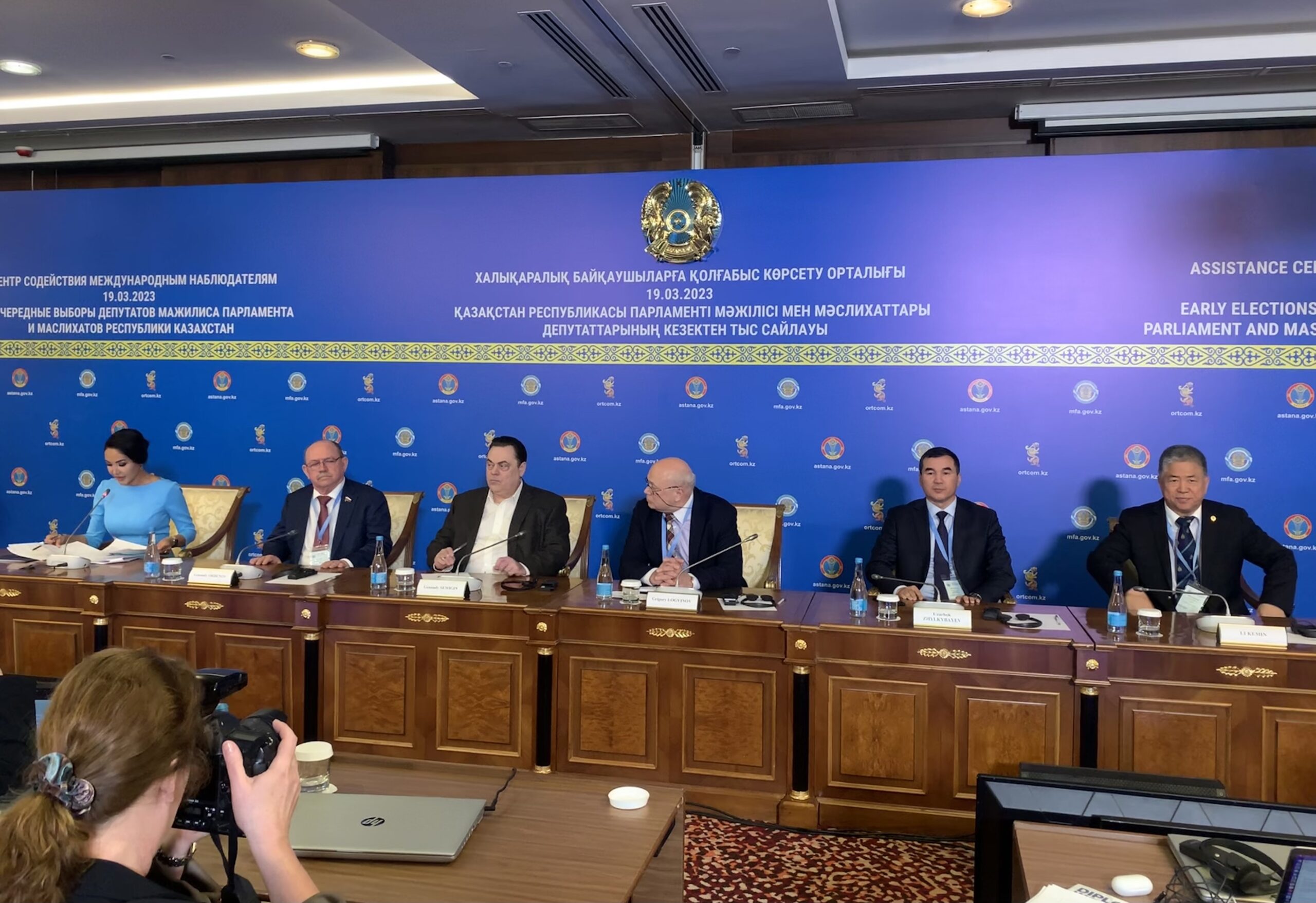ASTANA – Respect for the rule of law, transparent voting procedures, and accessible and civilian-oriented polling stations are among the few features of Kazakhstan’s parliamentary elections that define the country’s commitment to the expansion of democracy, said international observers at the press briefing in Astana on March 19.

Shanghai Cooperation Organization observer mission. Photo credit: The Astana Times.
Daniel Robert Kawczynski, a member of the U.K. Parliament and the U.K. Prime Minister’s Trade Envoy to Mongolia, commended Kazakhstan’s dedication to the expansion of freedom and democracy.
“We feel passionately in the United Kingdom about our democratic procedures, and we want to partner with countries who are, like us, pursuing the rule of law, freedom, human rights, and the democratic process. I must applaud the will of the Kazakh people in working together in such a short period of time, after the fall of the Soviet Union, to create this functioning democracy,” said Kawczynski.
Coming to Kazakhstan as an observer, he discovered several distinguishing features of the Kazakh parliamentary election that the U.K. might adopt.
One of them is the fact that in Kazakhstan, the elections are conducted on Sundays. “We always had our elections on a Thursday and people are extremely busy at work and doing other things. So I think it is very interesting that you have an election on a Sunday, which is normally the day of rest. People probably have more time to be able to participate,” he said.
He was also impressed by the doctors that each polling station had.
“That is just decency and consideration that we do not have in our country. Particularly in the wintertime for elderly people, if there is a medical problem they should be looked after, and I was very impressed by what I saw. That is something which I intend to recommend to my own government – that we show our citizens the same consideration as they are showing here in Kazakhstan,” he said.
On a lighter note, Kawczynski highlighted the general festive spirit in the polling stations with music being played.
“I think we ought to try to make polling stations enjoyable. It is all rather formal in the United Kingdom. Everybody goes in looking rather serious. Nobody talks to anybody else. They vote – they leave, and it is all rather officious. Here, it seemed people were talking, people were allowed to take photographs of each other voting, and it’s making the whole process of voting actually more enjoyable for the citizen, particularly for young people,” said Kawczynski.
With people bringing in their children, there was a bit of a family spirit, according to him.
Pedro Roque Oliveira, member of the Parliament of the Portuguese Republic and Vice-President of the Parliamentary Assembly of the Mediterranean, said Kazakhstan, a country that upholds the defining features of a democracy, such as the rule of law, freely elected parliament, strong opposition, and representative government, might serve as an example for the region.
“This is a very important moment for the consolidation of democracy here in Kazakhstan and not just for Kazakhstan. It is important to have a stable democratic country in this region of the world. It is important that this example of Kazakhstan is spread to the East, the North, and to the Southern neighbors,” he said.
Deputy Secretary General of the Shanghai Cooperation Organization (SCO), Grigory Logvinov said no election-related problems had been witnessed by the mission in the dozens of sites visited by them that were not negotiated in advance.
Led by Logvinov, the observer mission consists of 18 people, of whom 11 represent member states, and seven are officials of the two permanent operating SCO bodies.
A new element in the work of the SCO during this election included the meetings with the five parties participating in the elections.
“In the process, we discussed in detail the preparation for the elections in order to have a better grasp of the situation on the eve of elections and the presence of claims and complaints. There were instances where people disagreed with a candidate’s refusal to register or liquidation, but all problems were resolved exclusively in the legal field with the use of legal mechanisms,” said Logvinov.
“To a large extent, there was an understanding that de-registration was due to real circumstances and errors and the fact that the candidate did not meet the criteria stipulated by law,” he added.
Voting was largely peaceful and orderly, and voters were able to easily clarify all raised questions with the help of attentive staff members at polling stations, according to SCO observers.
“Since there were large ballots with a large number of candidates, of course, some people could have questions, and we saw enough examples where in an absolutely benevolent way brief, succinct, and clear explanations were given,” said Logvinov.
“We were impressed by the average age of the candidates [which is] under 46 years old,” said Logvinov.
“This means the deputy corps in Kazakhstan will be seriously rejuvenated after the elections, which will give the country a new dynamic, creative charge. We had the opportunity to feel the atmosphere of life in Kazakhstan, which has now entered a period of responsible and important changes within the framework of the doctrine of President Kassym-Jomart Tokayev of a New Kazakhstan,” he said.
Uzarbek Zhylkybayev, a member of the Kyrgyz Central Commission on Elections and Referendums, who participated as an observer in previous parliamentary elections in 2016, noted a higher turnout this time around.
“I observed the elections in the Zhambyl Region. At that time, the turnout was low, and today we have seen that people attend actively. This is because [people see] the candidates’ work and because there are now many single-mandate candidates, or, you can say, independent candidates. They work with their voters directly, and people have already recognized their potential. People want to see their representatives.”

